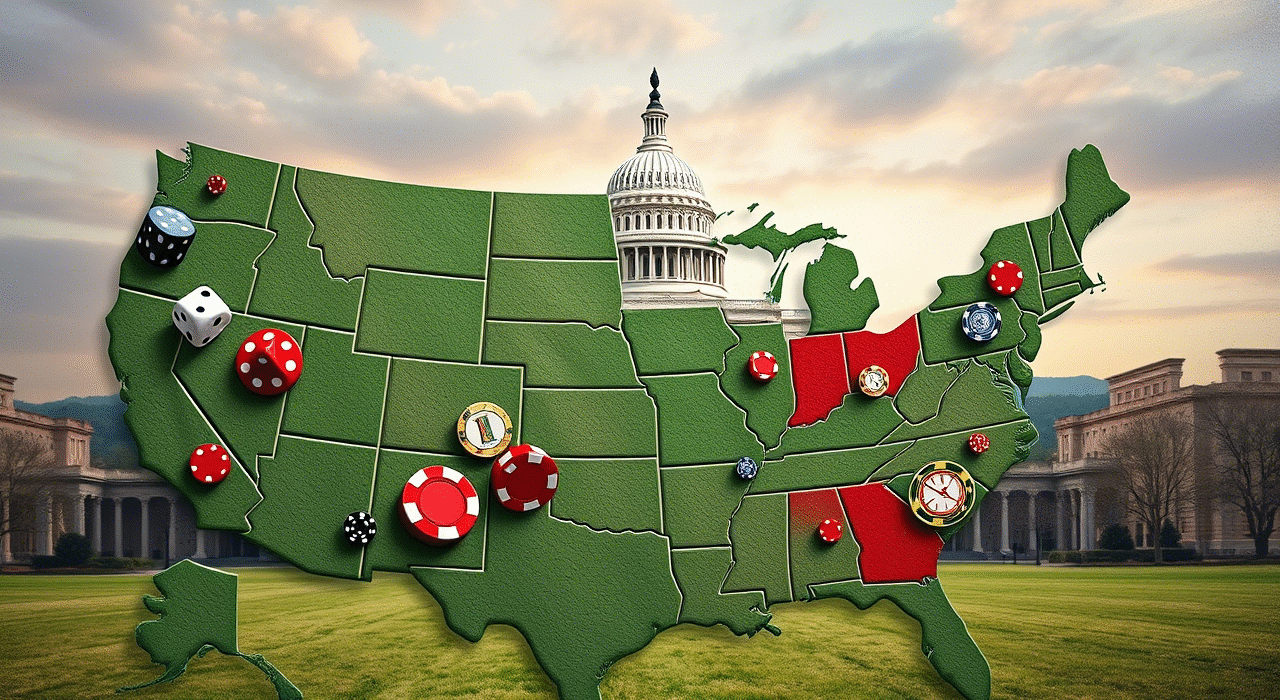🇺🇸 A Fragmented Industry at a Crossroads
Since the fall of PASPA (Professional and Amateur Sports Protection Act) in 2018, the United States has seen a tidal wave of gambling legalization—but without coordination. States have sprinted ahead with their own laws, tax rates, and enforcement priorities.
What we have now is a patchwork system where no two states look alike—and it’s creating friction for operators, regulators, and players alike.
Can the US, with its deeply rooted state autonomy, build a cohesive federal gambling framework?
Or will fragmentation remain the defining feature of American gaming?
🧩 The Current Landscape: Chaos by Design
Here’s a snapshot of what fragmentation looks like:
| State | Online Casino | Sports Betting | Poker | Regulator |
| New Jersey | ✅ | ✅ | ✅ | NJDGE |
| California | ❌ | ❌ | ❌ | None |
| Florida | ❌ | ❌* (under dispute) | ❌ | Seminole Compact |
| New York | ❌ | ✅ | ❌ | NYSGC |
| Michigan | ✅ | ✅ | ✅ | MGCB |
Each state has:
- Its own tax rates
- Unique license requirements
- Different technology standards
- Wildly varied responsible gambling mandates
For national operators and affiliates, it’s like trying to play poker while the rules change every hand.
⚖️ Why a Federal Framework Makes Sense
The idea of a federal regulatory body or framework for gambling isn’t new. Advocates argue it would:
- Standardize compliance (KYC, anti-money laundering, age checks)
- Simplify interstate poker/liquidity sharing
- Create a central consumer protection office
- Make advertising rules uniform
- Help tackle unlicensed offshore operators
- Enable faster innovation, including new technologies like blockchain, AI, or esports betting
Imagine the US having its own UKGC-style regulator—credible, centralized, and data-driven.
🚫 The Political Reality: States Don’t Want to Let Go
But let’s not kid ourselves: states love their gambling autonomy.
Reasons Why States Resist Federal Oversight:
- Revenue control: Gambling is a tax cash cow.
- Tribal sovereignty: Particularly in states like California, Arizona, and Oklahoma.
- Lobbying power: Local casino groups and horse racing interests hold significant sway.
- Historical distrust: Many states already see federal involvement as overreach.
A federal framework would mean relinquishing control over a growing source of income and influence—not something state governments are eager to do.
🏛️ Has the Federal Government Tried Before?
Yes, but mostly in restrictive or enforcement roles, not regulatory cohesion:
- PASPA (1992): Banned sports betting federally (struck down in 2018).
- Wire Act (1961): Restricts cross-border gambling communication; still used selectively.
- UIGEA (2006): Focused on blocking online gambling payments—chaotic, poorly enforced.
- IGRA (1988): Regulates tribal gaming via the National Indian Gaming Commission.
What’s missing is a proactive, unifying regulatory approach—one that encourages safe gambling, not just punishes illegal activity.
🌐 The International Comparison
| Country | Regulator | National Framework? | Notes |
| UK | UKGC | ✅ | Covers all betting, casino, online |
| Canada | iGaming Ontario (regional) | ⚠️ | Patchy, province-led |
| Australia | ACMA | ✅ | National laws, ad restrictions |
| Germany | GGL | ✅ | Unified rules, strict enforcement |
| US | — | ❌ | State-by-state chaos |
The US is quickly becoming an outlier in the developed world—massive market potential with minimal national oversight.
💡 What Would a Federal Framework Actually Look Like?
If the US moved forward, here’s how a model might be structured:
🏛️ Proposed Structure:
- Federal Gambling Commission (FGC)—an independent body
- Unified licensing tiers for sports, casino, poker, esports, fantasy
- Tech standards for RNGs, data integrity, player identity
- Cross-state player pools for poker and betting
- National ad code of conduct for responsible marketing
- Shared blacklists for banned operators and affiliates
- Real-time data sharing for fraud, AML, and match-fixing alerts
This doesn’t mean states can’t tax or regulate—it just standardizes the base level of legality and safety.
🧠 But Is It Realistic?
Short answer: not soon.
What would it take?
- Congressional push (bipartisan—rare)
- Industry alignment (hard, given current profits)
- Tribal buy-in (complex and politically sensitive)
- Consumer outcry over harm or scandal (often the real catalyst)
Until then, the market will keep evolving around its inconsistencies—with more offshore growth, affiliate confusion, and compliance headaches.
🧩 Compromise: Interstate Compacts and Regional Alliances?
One possible in-between solution is regional frameworks:
- Midwestern alliance for sports betting
- Eastern seaboard shared poker pool
- Federal baseline rules with state-level customization
These smaller initiatives could serve as blueprints for broader national regulation later.
🔮 Final Word: Will the US Get Its Act Together?
The US gambling industry is booming—but it’s a Wild West in terms of regulation.
Players face uneven protections. Operators juggle 50 different compliance playbooks. And innovation (like cross-chain gambling, AI engines, or crypto payments) hits roadblocks.
A federal gambling framework could bring clarity, fairness, and long-term stability.
But unless the politics shift, we’re more likely to see consolidation around big states like NJ, MI, and NY, not federal harmony.
For now, the dream of a unified US gambling law remains just that—a dream.











